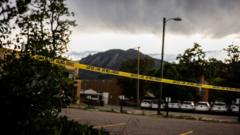The recent attack in Boulder, Colorado, where eight supporters of Israeli hostages were injured, has stirred discussions around immigration policies, especially in light of the suspect’s visa status and alleged ties to terrorism.
Boulder Attack Suspect's Immigration Status Raises Concerns About U.S. Policy

Boulder Attack Suspect's Immigration Status Raises Concerns About U.S. Policy
The incident involving an Egyptian national emphasizes ongoing debates about immigration and terrorism in America.
The Department of Homeland Security (DHS) announced that the suspect involved in the Boulder attack is an Egyptian citizen named Mohamed Sabry Soliman, who was in the U.S. illegally after his tourist visa expired in February 2023. Soliman had entered the country in August 2022 and, despite filing for asylum a month later, he remained without legal status when he allegedly used a makeshift flamethrower to assault a group of peaceful demonstrators advocating for Israeli hostages in Gaza.
Authorities have characterized the incident as a potential act of terrorism, following the injuries of eight individuals, with two reported in serious condition. As investigation details unfolded, Soliman was arrested and is facing multiple charges, including first-degree murder. The attack has raised significant concerns about the balance between immigration enforcement and national security.
Tricia McLaughlin, a DHS spokeswoman, confirmed Soliman's illegal status and his asylum application but did not provide further context on its status or ramifications. Meanwhile, questions have emerged regarding how such incidents might influence public perceptions of immigration laws and the risks deemed acceptable for citizens' safety. Federal officials from agencies like the National Counterterrorism Center previously reported no concerning information regarding Soliman, adding complexity to the narrative surrounding the attack.
As the investigation continues, the case is emblematic of broader national discussions around immigration policies, border security, and their relationship to acts of violence and terrorism within the United States.




















